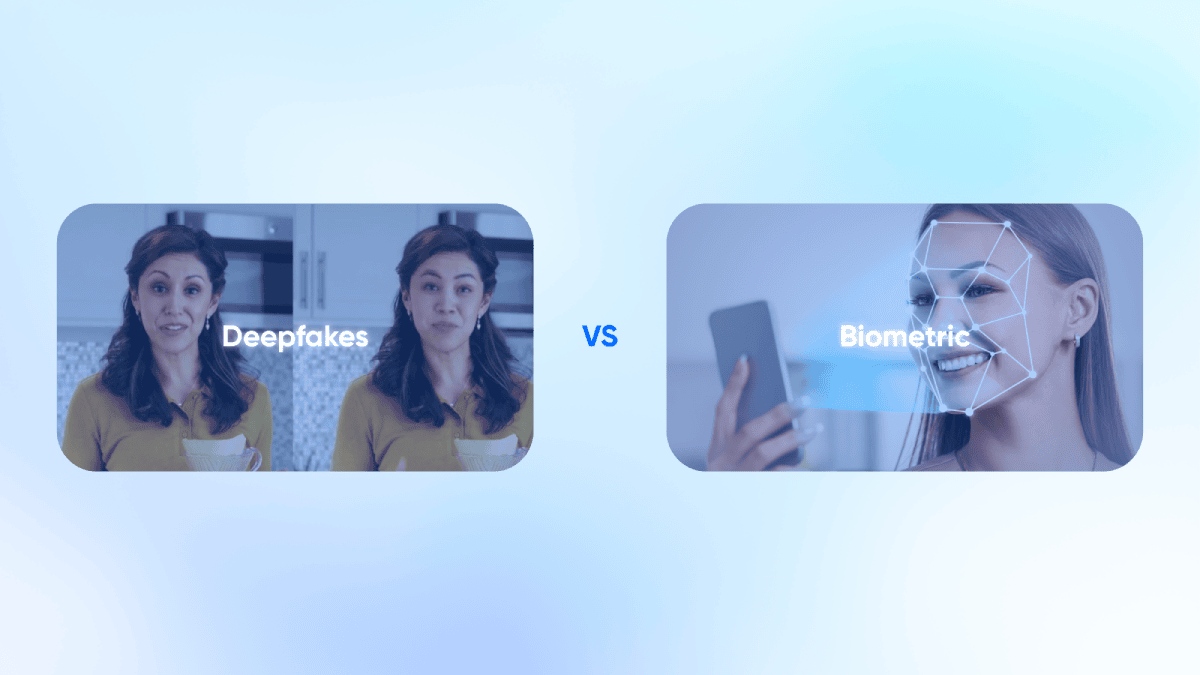Key takeaways
Biometrics as a Solution to Deepfakes: Biometrics provides an effective solution against the security risks posed by deepfakes, offering unique and unreplicable authentication methods.
Advanced Authentication: Biometric authentication and validation methods, such as facial and fingerprint recognition, are essential to verify identity in the digital age and prevent fraud.
Social Impact of Deepfakes: Deepfakes can have serious consequences on society, from damaging personal reputation and image to influencing public opinion and misinformation.
Didit's Biometric Technology: Didit leverages advanced biometric technology to ensure online interactions are authentic, contributing to a safer and more human internet.
Is the person next to you really who they claim to be? As deepfakes become more realistic, the thin line separating reality from fiction on the internet becomes blurrier. These digital clones, powered by the misuse of artificial intelligence, are becoming more authentic, more real, raising legitimate security concerns. However, biometrics can help make the internet more human and curb this fraud significantly.
The problem lies in the outdated methods used for identity verification (KYC) and checking human authenticity. These authentication and validation systems are often manual or based on hackable outdated techniques like photos or selfies.
Facing this issue, Didit emerges as a solution to create a genuine layer of the internet. We'll share more on how we work daily to humanize online interactions.
What is biometrics, and what are the most common identifiers?
Biometrics can be defined as unique, specific data related to a person that facilitates their recognition and authentication, making us unique, recognizable, and identifiable.
We encounter some identifiers daily, like using fingerprints or facial recognition to unlock our phones. Iris scans are becoming popular despite privacy concerns, and voice recognition is also used, along with unique traits like DNA, scent, walking style, or hand veins.
Deepfakes: A Growing Threat in the Digital Age
You've likely heard about deepfakes in the news. These are audiovisual documents (images, videos, or audio) generated by AI, mimicking a person. Sometimes, these clones are so realistic that they deceive people and services.
While some apps use this technology for entertainment, deepfakes pose significant challenges when used negatively.
This article dives deeper into what deepfakes are, how they're created, and the caution they warrant, emphasizing the skepticism needed for internet information.
Risks and Consequences of Deepfakes on Society
Deepfakes can seriously impact society by impersonating individuals and creating false content:
Reputation and personal image damage
The creation of fake videos showing a person saying or doing something they never did can have a devastating impact on their personal and professional reputation. Deepfake can be used for cyberbullying, revenge or defamation, damaging the victim's public image and destroying the trust they have earned throughout their life. In some cases, it can even lead to social ostracism or dismissal from employment.
Misinformation and manipulation
Deepfakes can be used to spread false information and propaganda more easily than ever before. This ability to manipulate public opinion can have serious consequences for society, eroding trust in democratic institutions and processes. Deepfakes can be used to influence elections, generate social polarization or even incite violence.
Fraud and scams
The ability of deepfakes to impersonate people opens the door to new forms of fraud and scams. Fraudsters can use deepfakes to impersonate other people and gain access to confidential information, conduct unauthorized banking transactions or even commit crimes such as identity theft.
Cyberbullying and digital violence
Deepfakes can be used to harass people online more viciously and effectively than ever before. Creating fake content that humiliates or ridicules a victim can have serious consequences for their mental health and safety. Cyberbullying with deepfakes can cause depression, anxiety, social isolation and even suicidal ideation.
Trust erosion in information
The proliferation of deepfakes can generate a generalized distrust of information, causing people to doubt the veracity of videos, images and audios. This can hinder access to truthful information and healthy public debate, as people will not know what information is real and what is false.
Long-term consequences
The consequences of deepfakes are not only limited to the short term. The erosion of trust in information, social polarization and the weakening of democracy can have lasting repercussions on society. Lack of trust in institutions and truth can hinder cooperation and the resolution of important problems.
Facial Biometrics: Didit's Shield Against Deepfakes
Deepfakes thrive in the absence of an internet identity layer, but facial biometrics can significantly address this issue.
At Didit, our mission is to humanize the internet. Proving humanity requires passing an NFC scan of official documents and an AI-based facial biometrics test, ensuring the individual's authenticity. Once verified, they can use their digital identity as needed.
How Does Biometric Security Work?
Biometric security is now a part of our daily lives, from Apple's Facial ID to Android devices' fingerprint recognition. This layer is a robust way to protect important data and documentation, being nearly impossible to replicate.
With Didit, you can store your essentials and link them to your decentralized digital identity, keeping them organized, secure, and backed up with a layer of biometrics, contributing to a more human and fraud-free internet.

